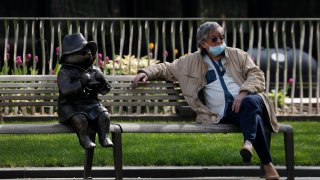
Researchers from the Harvard T.H. Chan School of Public Health have warned that, in the absence of a vaccine or an effective treatment of the coronavirus, social-distancing measures may be required through to 2022.
In a study published in the journal Science on Tuesday, a team of epidemiologists at Harvard assessed what is known about Covid-19 and other coronaviruses to anticipate possible scenarios for the current global health crisis.
It said social-distancing measures, such as school closures, bans on public gatherings and stay-at-home orders, may have to remain in place for at least the next couple of years.
“Absent other interventions, a key metric for the success of social distancing is whether critical care capacities are exceeded,” they wrote in the report. “To avoid this, prolonged or intermittent social distancing may be necessary into 2022.”
The researchers said it is critical to discover whether the coronavirus can be wiped out after this initial pandemic wave, like the SARS outbreak of 2003.
If this is not the case, the Harvard team say it is likely that Covid-19 will re-emerge every winter like other, more common, coronaviruses.
“Even in the event of apparent elimination, SARS-CoV-2 surveillance should be maintained since a resurgence in contagion could be possible as late as 2024,” they wrote in the report.
Profoundly negative consequences
The coronavirus pandemic has meant countries around the world have effectively had to shut down, with many governments imposing draconian measures on the lives of billions of people.
Confinement measures have been implemented in 187 countries or territories in an effort to try to slow the spread of the global outbreak.
As of Wednesday, nearly 2 million people had contracted Covid-19 worldwide, with 127,590 deaths, according to data compiled by Johns Hopkins University.
Some European countries have cautiously moved to emerge from lockdown after enduring several weeks of stringent social and economic restrictions.
The U.S., the global epicenter of the coronavirus outbreak, has signaled May 1 as a potential date for easing restrictive measures.
Researchers at Harvard said they were aware that prolonged distancing, even if intermittent, was likely to have “profoundly negative economic, social, and educational consequences.”
They stressed that their goal in modeling such policies was not to endorse them but rather to spur innovative ideas and to expand the list of options to bring the pandemic under long-term control.
The study went on to say that it is important to understand whether people can become immune to the coronavirus after they have been infected, noting that this is not yet known.
The World Health Organization has said that evidence from several countries around the world was giving them a “clearer picture about this virus, how it behaves, how to stop it and how to treat it.”
The director general of the United Nations health agency, Tedros Adhanom Ghebreyesus, said at a media briefing earlier this week that: “Our global connectedness means the risk of re-introduction and resurgence of the disease will continue.”
“Ultimately, the development and delivery of a safe and effective vaccine will be needed to fully interrupt transmission,” he warned.
This story first appeared on CNBC.com. More from CNBC:

